"Is having your brand advert on an irrelevant obscure and disappointing article which you arrive at via click-bait the same as having your brand exposed during an ad-break in a highly engaging moment on a hugely loved TV show - led by a broadcaster of immense empathy and integrity?Pursuit of ratings at the lowest possible cost leads to click-bait publishing. It leads to the Facebook-isation of all news media - and an overall loss of integrity and trust in all media.
Down this path lies a poisoned well for the advertisers who are seeking to engage with us - their consumers. As a result of being hard-nosed and ruthless about aiming for the lowest possible cost of acquiring an audience with a consumer - integrity, authenticity and values - qualities that John Campbell and Campbell Live have in spades - are left on the cutting room floor." - Alastair Thompson, Scoop Editor.
#SaveCampbellLive
Why
Scoop Is Launching A Campaign For Advertiser
Responsibility
By Alastair
Thompson
Why Scoop Is Launching A Campaign For Advertiser Responsibility
By Alastair Thompson
Contents:
Something is
Rotten In The State of NZ News Media
The
Rise Of Click Bait & The Danger Of Metrics
#SaveCampbellLive Shows We Do Care What Is On Our
News
Advertiser Responsibility & The
Desirability Of Integrity
Something is Rotten In The State of NZ News Media
The barbarians are no longer at the gates of the NZ News Media. That have taken over the town and are busy setting it all on fire.
Take this morning's @Stuffnz front page.
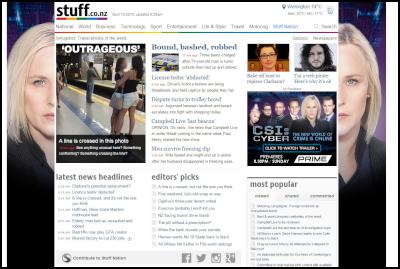
The "OUTRAGEOUS" headline on the left is to an obscure lifestyle section story about a weird slightly viral Facebook post which challenges homophobia in a spectacularly oblique fashion.
A few minutes later refresh the page and now it reads "Not Normal".
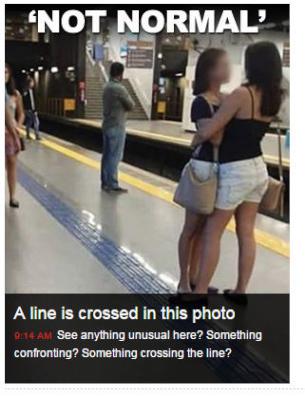
Somebody this morning is clearly putting a lot of effort into presenting this particular piece of click bait for maximum clickiness. (The headline is still there an hour later as this piece is published - so it must be performing).
The Rise Of Click Bait & The Danger Of Ratings Metrics
For a clue as to what is going on readers may want to listen to an interview Sinead Boucher "Chief Editor" at one of NZ's largest news publishing company, Fairfax Media.
Stuff.co.nz is now the flagship for Fairfax in NZ and Sinead has recently announced a reorganisation of the Fairfax editorial management which will facilitate the adoption of a "Digital-Centric" strategy - the main purpose of which appears to be to focus more on the Stuff.co.nz website which Sinead is delighted to report has recently reached 1.7 million unique readers taking it into the No.1 position in news, ahead of Yahoo.co.nz.
You will need to scroll forward to 13 minutes 10 seconds to hear Sinead's explanation for what is happening at Fairfax. Although Fairfax has installed ratings display TVs in all of its newsrooms showing the top rating stories on the website, according to Sinead this doesn't mean the business is focussing on "Click Bait". Evidence however would suggest otherwise.
More shockingly for this listener however were the vague handwaves Sinead made towards how she believed the publishing strategy they are adopting will lead to making money. Sinead says her focus is on securing a large audience, from which Stuff hopes to recruit "members". This, she implies, will somehow magically turn into a source of revenue for the company.
Around the same time that Fairfax decided to turn its editorial back on it's newspapers and its editorial advertisers - the source of 80% of its revenue - it was revealed that Yahoo NZ is laying off it's entire 10 strong editorial team. Admittedly these people do very little news writing - but the fact the No. 2 in NZ News is reducing its editorial workforce to a similar size to Scoop's (it is planning to rehire some) - due presumably to falling digital advertising revenues - is illustrative of the scale of the challenge facing New Zealand's online news businesses.
As a news publisher myself what I do not understand is why when it is clear that the current approach to click-bait publishing can't possibly work it remains completely dominant among online publishers. The following is a screenshot from the Yahoo front page right now - like Stuff.co.nz, it matters very little when you look at it.
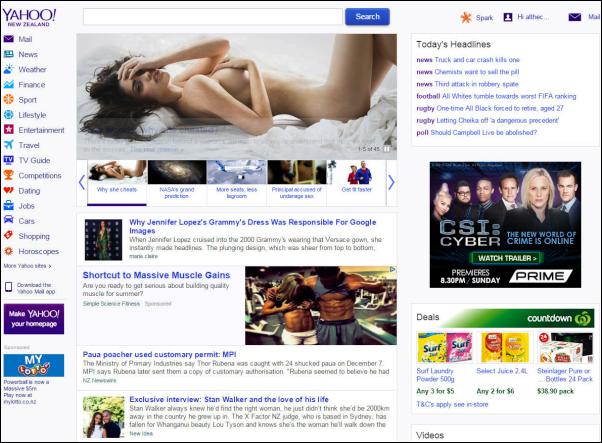
A few weeks ago while thinking on this thought I tweeted the following snapshot of editor's picks at three of NZ's major publishers plus Scoop.co.nz. It seems that Editor's picks are nothing of the sort - the use of the word Editor would imply that Editor's think you the reader ought to read them.
These days "Editor's Picks" have become an exercise guessing the clickability of a selection of random prurient trivialities.
Editors Picks - @scoopnz @NZStuff @nzherald @3NewsNZ pic.twitter.com/wJZX9ogsQR
—
Alastair Thompson (@althecat) March
24, 2015#SaveCampbellLive Shows We Do Care What Is On Our News
The Fairfax and Yahoo debacle provides a backdrop to the news of the moment - the imminent demise of the indisputably most respected brand in public interest news in NZ - Campbell Live and its host John Campbell.
While we are perhaps seduced by the click-bait. The volume of complaining about the state of NZ News Media is growing ever louder. And this may explain some of the intensity of the public response.
In far less than 24 hours nearly 50,000 NZers have already signed petitions expressing their outrage and indignation at the prospect of the loss of the single figure in NZ Journalism who best epitomises integrity, honesty and courage.
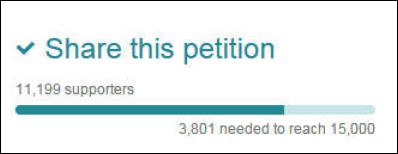
Change.org
Is today the day the heart of NZ News died?
Media responses are predictably blaming Campbell's impending demise exclusively on its ratings performance. And over at Throng Regan Cunliffe - the go-to guy for NZ TV Ratings commentary - is suggesting that the only way people can save Campbell Live is to watch it.
But while this may well be true. Is it right that this is so?
It certainly highlights some important questions for publishers, advertisers - and indeed all of us to consider.
Does having proper news services matter for NZ?
Are ratings points the only measure of the value content - or should qualitative assessment also be considered?
How can we as consumers of media better communicate to publishers and advertisers the values that we ascribe to different kinds of News Media?
Hamish Keith succinctly pointed to this in two tweets this morning.
Classic conflict @CampbellLiveNZ
v @TV3nz price
versus value and our decency or not as a nation will be
measured by the outcome
— Hamish Keith (@hamish_keith)
April
9, 2015Why don’t @TV3nz measure the
support raised for major causes by @CampbellLiveNZ
and assess its worth on that rather than dumb greed
—
Hamish Keith (@hamish_keith) April
9, 2015The answer of course to Hamish's question - which has been pointed out frequently this morning - is that Mediaworks is a business. The "values" that matters to them is amount of revenue in their bank account, not any notions of public good.
Similarly Fairfax is also a business. And it is its "business" pursuit of the dollar that is taking Stuff.co.nz down a rabbit-hole of click-bait stupidity.
Regular news website readers may have noticed that both Stuff.co.nz and NZHerald.co.nz have auto-starting video's on as many pages as they can put them on. This is because online video "pre-roll" adverts are fast becoming the only real source of revenue for the publisher they are prioritising video over all else.
Perhaps they know that this is a race to the bottom. Perhaps they don't. Whatever, they read the market signals and they follow them. This is the way capitalism works.
But they should consider this.
Yahoo NZ recently reported roughly $13 million in revenue and a $3 million profit. Yahoo is selling advertising directly in competition to Stuff (today they are both carrying Prime TV adverts for CSI). Yahoo with similar sized audience are making just $3 million per year. Fairfax's decision to focus its attention on its online business, and to apparently try to be more Facebook, is a path to certain destruction.
Mediaworks however is a different proposition.
Like Fairfax Mediaworks have to respond to market signals and like Fairfax they know that "real news production" is expensive and delivers a financial reward that when compared to purchasing an overseas hit TV show and selling adverts by the rating point just can't compete with.
However Mediaworks is still working with two functioning adverting business income streams, TVCs and Radio Spots.
And as the screws go on Julie Christie wants some more money to make her "bankable" reality TV, and taking some of that cash of Campbell Live is probably the only option. The fact that her boss former NZX CEO Mark Weldon is a fan of the idiotic Paul Henry helps to make wielding the axe easier.
And this also tells us where one possible avenue to fight against these mega-trends lies - we need to talk to the advertisers.
Advertisers have been convinced by the advertising and marketing business that all eyeballs are equal.
However this is nonsense.
Is having your advert on an irrelevant obscure and disappointing article which you arrive at via click-bait the same as having your brand exposed during an ad-break in a highly engaging moment on a hugely loved TV show - led by a broadcaster of immense empathy and integrity?
Of course not.
Advertiser
Responsibility & The Desirability Of
Integrity

When Kills and Moon were booted from X-Factor for bullying Joe Irvine pressure from advertisers played a key role. When Willie and JT were booted from Radio Live - in the wake of their appalling Roastbusters victim interview - ditto.
They did this because they didn't want to be associated with in the first instance bullying, and in the second instance rape victim shaming.
Ratings didn't come into it.
Money talked and the broadcasters walked.
While it's possibly not a good thing that NZ's news media are completely dependent on advertising - and are apparently increasingly vulnerable to the views of their advertising clients- until a large shift takes place in media funding we can but observe that this is now the case.
And this gives us - the viewers, listeners and readers - a second lever to seek to influence decision making when it comes to what we are exposed to in our media.
In both the X-Factor and Radio Live cases the brands responded either to direct public pressure via social media, or to concerns that they were about to be inundated by a social media tsunami of outrage.
And for this reason it is perhaps time to seek to get NZ's largest advertisers to consider how the current scenario plays out for them.
In the 21st Century brands of all kind are seeking authenticity, values, integrity - and this is why they Kills, Moon, Willie and JT got chopped - the brands that supported those shows are incredibly sensitive to being associated with anything corrupt or tainted.
And yet most advertisers continue to buy advertising and spend their advertising dollars - whether on TV, online, print or radio - primarily on the basis of rating points.
And in doing so they are sending the wrong message to the publishers who serve them.
Pursuit of ratings at the lowest possible cost leads to click-bait publishing. It leads to the Facebook-isation of all news media - and an overall loss of integrity and trust in all media.
Down this path lies a poisoned well for the advertisers who are seeking to engage with us - their consumers. As a result of being hard-nosed and ruthless about aiming for the lowest possible cost of acquiring an audience with a consumer - integrity, authenticity and values - qualities that John Campbell and Campbell Live have in spades - are left on the cutting room floor.
And this is why Scoop.co.nz is going to press ahead with a campaign to encourage more responsible advertising purchasing in New Zealand.
Campbell Live's predicament provides the perfect lightning rod for this message to reach the mass audience that it needs to reach for the corporate bosses and marketing supremos to listen.
And there is much much more at stake than just Campbell Live.
Scoop endorses this petition - please sign it and share it on Facebook and watch this space. There will be more to come.
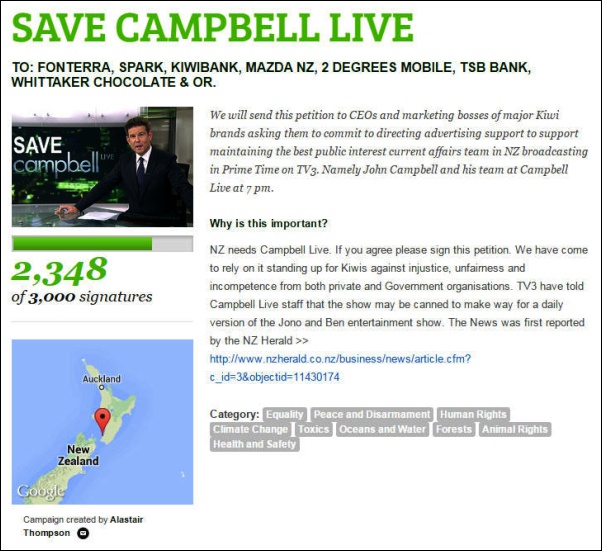
- Alastair Thompson, Friday, 10 April 2015
ENDS



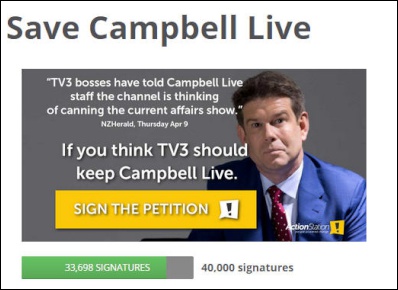
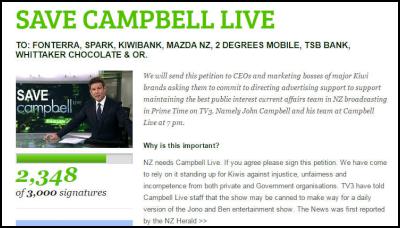
 Ian Powell: Gisborne Hospital Senior Doctors Strike Highlights Important Health System Issues
Ian Powell: Gisborne Hospital Senior Doctors Strike Highlights Important Health System Issues Keith Rankin: Who, Neither Politician Nor Monarch, Executed 100,000 Civilians In A Single Night?
Keith Rankin: Who, Neither Politician Nor Monarch, Executed 100,000 Civilians In A Single Night? Eugene Doyle: Writing In The Time Of Genocide
Eugene Doyle: Writing In The Time Of Genocide Gordon Campbell: On Wealth Taxes And Capital Flight
Gordon Campbell: On Wealth Taxes And Capital Flight Ian Powell: Why New Zealand Should Recognise Palestine
Ian Powell: Why New Zealand Should Recognise Palestine Binoy Kampmark: Squabbling Siblings - India, Pakistan And Operation Sindoor
Binoy Kampmark: Squabbling Siblings - India, Pakistan And Operation Sindoor